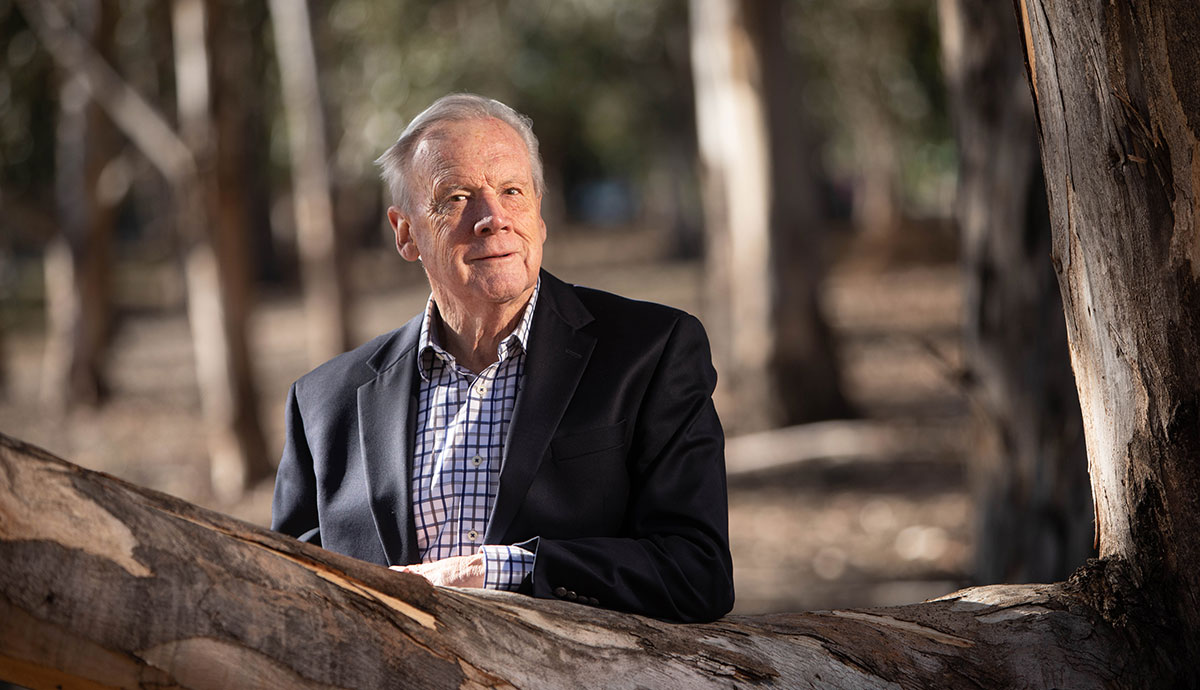June 27, 2018
Curiosity sparks career-long service to research ethics
Order of Australia for UOW health law and ethics professor
Curiosity sparked while challenging final-year law students has led to a satisfying 30 year career and an Order of Australia award for UOW human research ethics expert, Professor Colin Thomson.
Professor Thomson was awarded a Member (AM) in the General Division of the Order of Australia in the 2018 Queens Birthday Honours List “for significant service to medical research, particularly to research ethics, to education, and to professional organisations.
Having moved into academia after some years as a practicing solicitor, it was while teaching legal theory to over-confident final year law students at the Australian National University (ANU) that Colin’s career took an unexpected turn.
“The students were too arrogant, believing they could solve anything.
“I wanted to challenge them with a dilemma in an area where the law doesn’t work well so I confronted them with the legal resolution of ethical challenges of the rights of terminally ill patients.”
The exercise unexpectedly sparked a deep curiosity that compelled him to study at the Hastings Centre in New York, USA - the world’s leading bioethics research institute.
After returning to Australia, Professor Thomson established a law and medical ethics course at ANU and served on the Medical Research Ethics Committee of the National Health and Medical Research Council (NHMRC) from 1987 until 1991.
His work attracted the attention of UOW Law School founding Dean, Professor Jack Goldring, and former ANU colleague, Professor Helen Gamble. Together they recruited him to UOW to teach in UOW’s new law faculty and teach nursing graduate students.
In 1994, Professor Thomson, with other University staff, prepared a report on Ethical Research and Ethics Committee Review of Social and Behavioural Research Proposals for the Commonwealth Government. This led to him joining the Illawarra and Shoalhaven Local Health District (ISLHD) Board’s Ethics Sub-Committee which, in turn, led to membership and chairmanship of the joint ISLHD/UOW Human Research Ethics Committee from 1997 to 2002.
Beyond UOW, Professor Thomson’s research ethics advisory roles between 1988 and 2018 included Deputy Chair of the Australian Health Ethics Committee from 1997 until 2002, when he left the University to take up a four year appointment as Consultant in Health Ethics to the NHMRC. During that time, he served as Executive Editor of the NHMRC Human Research Ethics Handbook and convener and facilitator of the National Research Ethics Training Program from 2004 until 2005.
In 2006, he was appointed Chair of the Australian Health Ethics Committee and, wanting to ’keep his hand in’, approached the University to seek a fractional appointment.
With the support of then Acting Dean of the Law School, Damien Considine and then Vice-Chancellor, Professor Gerard Sutton, Colin returned to UOW on a part-time basis working in research ethics with the Research Services Office and contributing to the health law and ethics component of the Personal and Professional Development curriculum of the emerging Graduate School of Medicine.
Professor Thomson has continued as Professor and Academic Leader in Health Law and Ethics in Graduate Medicine and in 2013 joined, and later chaired, the ISLHD/UOW Human Research Ethics Committee.
He retires on 30 June this year.
Professor Thomson is a Life Member and Past President of the Australasian Association of Bioethics and Health Law, along with other roles with professional associations, including the Australasian Ethics Network, an initiative of UOW that fosters collaboration among Australian and New Zealand university human research ethics staff. He has advised and trained human research ethics committees in state health departments and Australian universities since 2002.
He described receiving his Order of Australia as a “huge honour”.
“I’m very satisfied with the contribution I have made and I have enjoyed doing the work, but this is a step up. It took a while to sink in.
“The most satisfying aspect has been spending time with people who serve as volunteers on research ethics committees. It has been an honour to advise and train such keen people who are so deeply committed to seeing research done well.
“I am very grateful to the University for the opportunities it has afforded me and to the academic and professional staff with whom I have had the privilege to work.”
